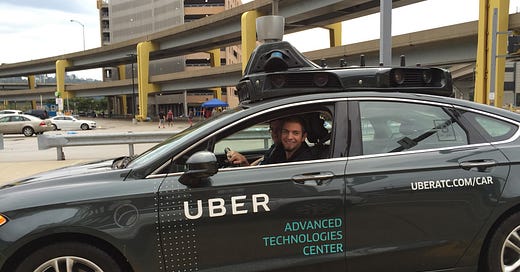A stale Uber expose from The Guardian
The Guardian digs up old dirt on the tactics Uber used to become a global tech giant and thinks it has struck gold.
It’s hardly news.
In fact, a lot of it is seven-year-old emails.
But with “The Uber Files” the lefties at The Guardian newspaper are making a big deal out of “a leaked trove of confidential files” they say “has revealed the inside story of how the tech giant Uber flouted laws, duped police, exploited violence against drivers and secretly lobbied governments during its aggressive global expansion.”
The unprecedented leak to the Guardian of more than 124,000 documents – known as the Uber files – lays bare the ethically questionable practices that fuelled the company’s transformation into one of Silicon Valley’s most famous exports.The leak spans a five-year period when Uber was run by its co-founder Travis Kalanick, who tried to force the cab-hailing service into cities around the world, even if that meant breaching laws and taxi regulations.
During the fierce global backlash, the data shows how Uber tried to shore up support by discreetly courting prime ministers, presidents, billionaires, oligarchs and media barons.
Here’s what I sent to The Guardian, which has no place to send comments.
Uber — thanks to the aggressive, f-u tactics of its founder Kalanick — may have done some things wrong.
As far as I know it never killed anyone, stole anyone’s money or property or put racist policies into effect.
What it did do was revolutionize urban transportation around the world — for the better.
Starting in 2014 it began breaking down horrible taxi and transit laws in cities in the US (and around the world) that were protecting politically connected local taxi monopolies that, in the US case, had for decades been robbing the poor with high fare prices, providing no or lousy service to poor urban neighborhoods, ignoring the suburbs almost entirely, enriching its monopoly (often mobbed up) owners and generally fucking over the general populace that needed taxi service the most — the poor and the carless.
Your piece — a little dated, perhaps? — barely hints that Uber was challenging these rotten state and local laws in the US that were protecting the legacy taxi monopolies.
The laws Uber was brazenly flouting were bad laws —transportation laws that 99 percent of local and national journalists and the media in general mindless defended from 2015 onward without having a clue about who the bad laws benefited and who the bad laws hurt.
Your story proves that you are so captured by your simplistic anti-capitalist ideology that you can not fairly write a story about Uber.
Uber — again, an imperfect company in its early years — has dethroned many privileged taxi monopolies in the US and Europe.
Your working-class biases should make you cheer that development, or at least note it.
Like it or not, realize it or not, Uber’s real and imagined corporate venial sins have allowed tens of millions of people around the world — everyday people, poor people, drunk people, suburban people — to move around their cities in better and cheaper ways.
I was an Uber driver in Pittsburgh for seven years. I saw the benefits of Uber’s lawbreaking every weekend.
Here’s what I’ve written about my career as an Uberman.
Here’s a photo I took at a small meet-up of fellow Uber drivers in San Francisco in 2018, where the newish (and lightly bearded) CEO Dara Khosrowshahi showed up to do some group schmoozing.





